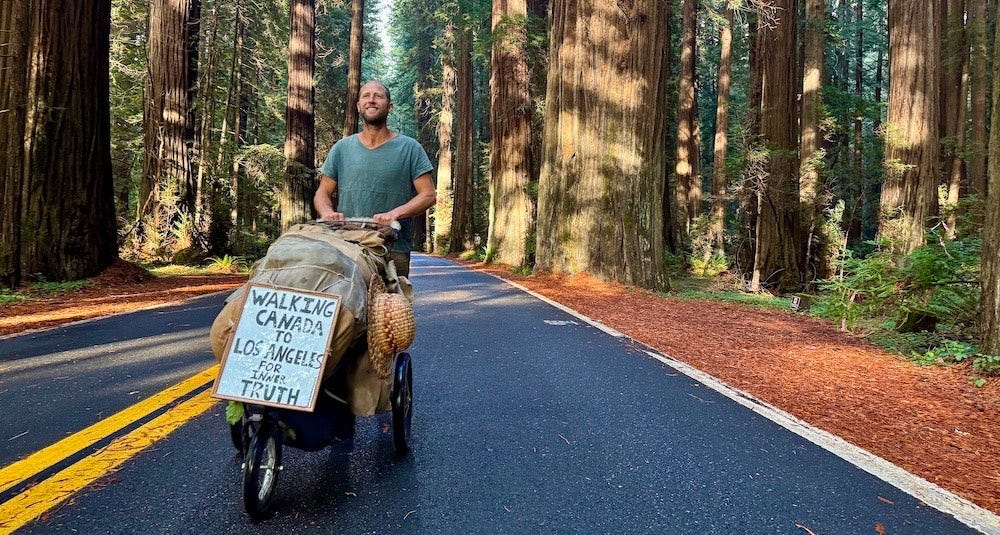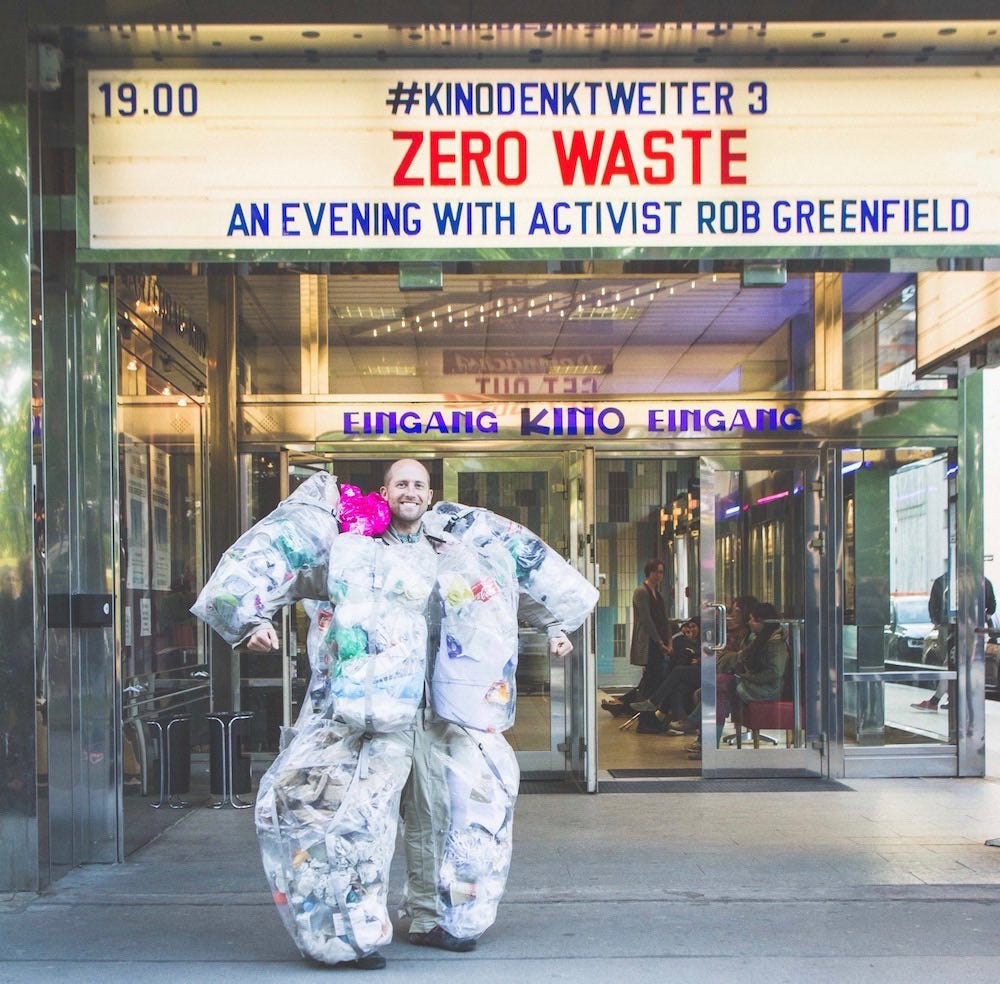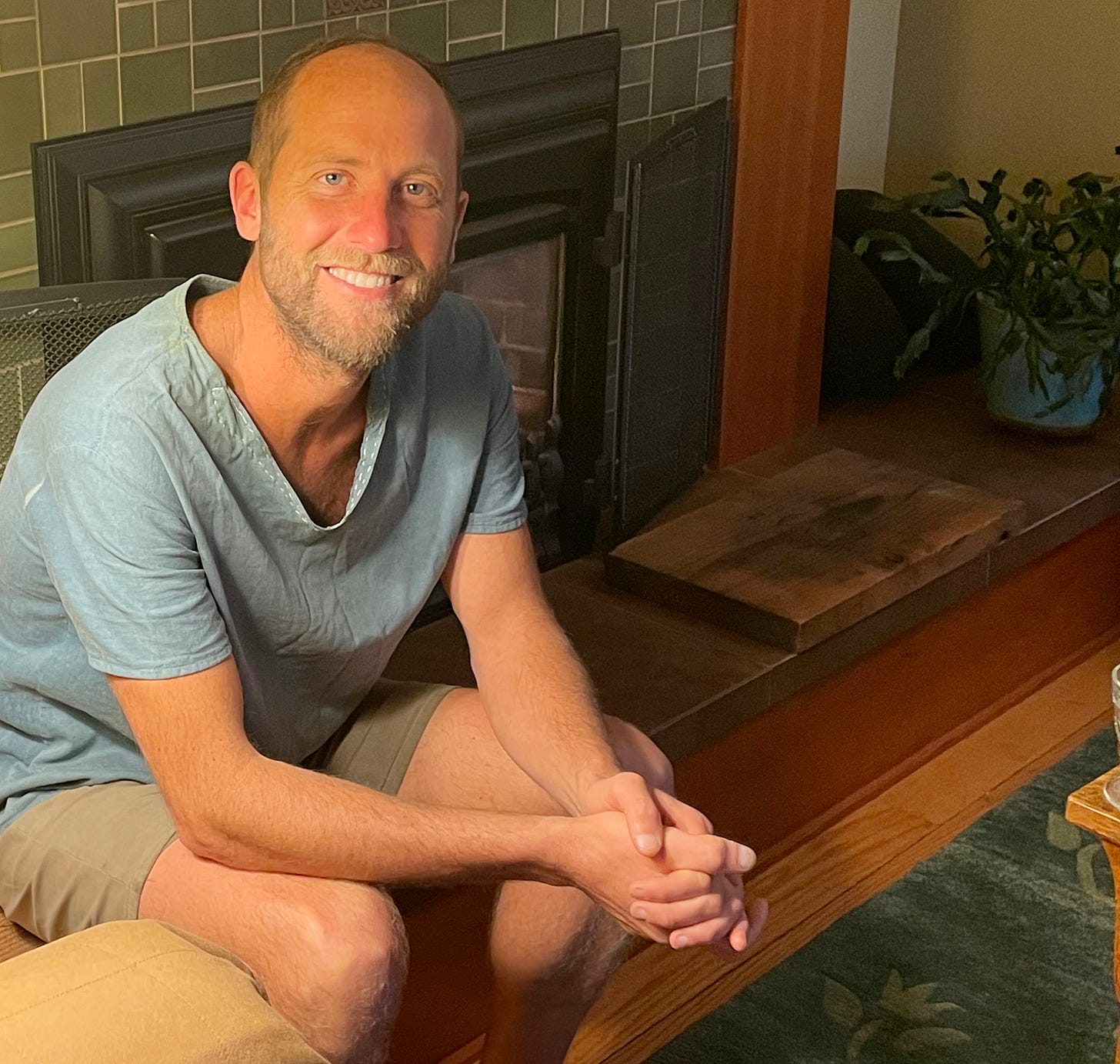Environmentalist Robin Greenfield stops by Sebastopol on his 1,625 mile walk
Greenfield is walking from Canada to LA to divest himself of all his material goods and attachments

Radical environmentalist Robin Greenfield stopped over in Sebastopol for a few days during his 1,625-mile walk down the coast from the Canadian border to Los Angeles. He’s been staying with Dan and Sarah Gurney and gave a talk last night before a small audience of folks ranging from fans to the merely curious at a music studio on First Street.
I don’t use the word “radical environmentalist” lightly, but there’s no other word to describe Greenfield, who eschews American consumerism, owns very few possessions and is en route to getting rid of those.
His long walk is just one of many such stunts he’s done to draw attention to the ways American culture damages the earth. He has ridden bikes across America three times (once on a bamboo bike), uses leaves instead of toilet paper, and is perhaps best-known for a stunt where he lived as a regular American for one month and wore a suit of all the trash he created in that time. He also went for a year without showering—he bathed in lakes and creeks—to highlight the issue of water conservation. He spent a year growing and foraging all his food.
Greenfield has written four books, two of them for children. These include Dude Making a Difference: Bamboo Bikes, Dumpster Dives and Other Extreme Adventures Across America; Zero Waste Kids: Hands-On Projects and Activities to Reduce, Reuse, and Recycle; Be the Change: Robin Greenfield's Call to Kids—Making a Difference in a Messed-Up World; and Food Freedom: A Year of Growing and Foraging 100% of My Food.
His most recent book, Food Freedom, was self-published—in part so he could give it away. The book details his adventures of living without grocery stores or restaurants for a year. Living in the city of Orlando, Florida, he turned lawns into food gardens with over 100 plant species and foraged 200 species of plants and mushrooms from the wild.
Greenfield, who has a BA in biology, also has a background in marketing, and it shows. His adventures are amplified on social media and on his website, robingreenfield.org.
His website describes him this way: “Robin Greenfield is a truth seeker, activist, social reformer and servant to Earth, humanity and our plant and animal relatives.”
It wasn’t always this way.
Greenfield grew up poor in Wisconsin, one of four children of a single mother who made $18,000 a year. They were Jews in a predominantly conservative Catholic town. His mother was a hippie.
“I always felt like an outsider,” he said. “And the thing that I wanted more than anything was to belong—to just be normal.”
He found that sense of normalcy when he moved to San Diego.
“Before 2011, I was living in many ways a fairly typical U.S. American lifestyle,” he said. “I was very focused on financial wealth and material possessions and what people would consider success. I was pursuing the American Dream, and I was excited to be doing so. In fact when I was 25, I had the goal of being a millionaire by the time I was 30, and I was actually on track. I had a marketing firm and I was happy and I was healthy and I had friends and I had loved ones and I had no real need to change my life.”
“And then something happened: I just started to read books and watch documentaries and learned that the way that I was living was causing incredible destruction to the world: everything from the food I was eating to the car I was driving to the gas I was pumping in the car, the cheap stuff I was buying at the store, the trash I was creating. So I just made a pretty logical and rational decision to change my life, to transform my life to live in a way where my actions didn’t cause destruction and weren’t a part of injustices and inequity. And instead to change my actions to be not only neutral, but actually beneficial to the people that I was interacting with and the plants and animals I was interacting with and to this earth that we all live on.”
It wasn’t an easy transition, he said. It took him about four years to make the change.
“I definitely experienced some doom and gloom realizing that the government was lying to me; the corporations were lying to me; the average person, society was often lying to me. It was just in an incredible state of delusion that I was living in—that our whole society is living in,” he said.
He decided to take his life back one step at a time.
“My life was so wrapped up in the web of consumerism. For the next couple of years, it was my full-time job to just unravel the web that I had strung together. And as I clipped each of those strands, I made a new strand in the web that would be one of actually being of benefit to the world, which is really hard to pull off in this society.”
“What I did is I made a list of over 100 changes I wanted to make, with the goal of making at least one positive change per week for two years,” Greenfield said. “And that adds up to 104 positive changes in two years. So imagine if you woke up tomorrow, and you were doing 104 things differently. You might have a nervous breakdown. You might be like, who am I? You know, imagine your clothes are different. Maybe your friends are different. Where you’re going is different. The food you’re eating and the smells in your house are different. Most of your identity can be transformed a pretty substantial amount by about 100 or so changes. So it was fairly quick, but at the same time, it was fairly measured as well.”
He canceled all his credit cards, cashed out his IRA and life insurance, closed his bank accounts.
“Another really big change that I made at the age of 25 is I actually got a vasectomy,” he said. “I already knew I was going to dedicate my entire life to what I’m talking to you about right now, and that my mission would not be an alignment for me, personally, to have kids.”
And then, as it often does, the person became political.
“I started to do environmental activism,” he said. “My first trip was a bike ride across the country on a bamboo bike. That was in 2013. I was just living sustainability to the extreme and riding my bike up to the local newspapers and news stations. And I'd say, ‘Hey, I'm biking across the country on a bicycle made out of bamboo with a trailer covered in solar panels. You want to do a story?’ And they’d come out every single time. I was starting to get a little more media attention and that became my means of being the change I wish to see. That was always at the heart of it. From the very beginning, I wanted to reach millions of people and show people another way was possible.”
Greenfield doesn’t expect people to live like he does. He said he just wants to make them think about how they’re living.
“You don't have to go as far as I do,” he said. “That’s not the point. If people think that that’s the message, they’re not really listening. That’s a defense mechanism. The message is, ‘What can you do to bring more joy and meaning and purpose to your life, and in doing so, align yourself with the earth and with the plants and animals and with community?’”
Greenfield’s current journey down the coast is as much of a spiritual journey as a political one. Ghandi is a major guiding light for him. He said that as he’s walking he’s trying to get rid of all his internal hang-ups, fears, embarrassments and secrets. When he reaches Los Angeles, Greenfield plans on giving away the few possessions he has left, including his clothes.
“Gandhi, for example, at the end of his life, had like 13 possessions, or something like that,” he said. “And of course, the Buddha, you know, he didn’t own anything, right? You don’t need to own anything when your focus in life is to have a liberated mind and to be a servant to the earth and to humanity.”
After divesting himself of all of his worldly possessions, he’s going to do a 30-day Vipassana retreat in 29 Palms.
He’s not sure what will happen after that.
“I don’t know what I’m going to do yet. I see myself doing a lot of volunteering. I see myself at the library quite a bit, at food banks, community gardens, just kind of volunteering. And I also see myself potentially just sitting in a park a lot and maybe just making myself accessible to anybody who wants to sit and practice compassionate communication and people who are interested in breaking free and living in higher truth and integrity. I’ll just sit in the park, and if people come, they come, and if they don’t, I get to sit in the park.”




You guys do the best job at getting us stories we need to hear! Thank you!
Don’t get me wrong. I really enjoy your column and read it every chance I get. I subscribe. But: hippy describes girth and hippie is, well, you know.